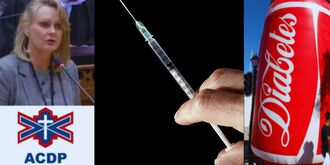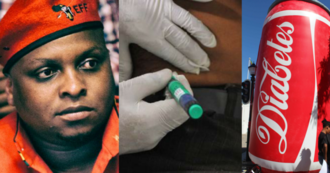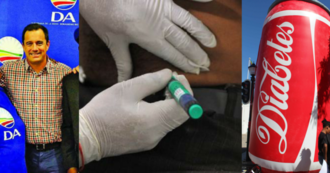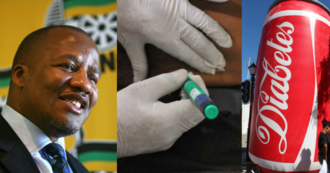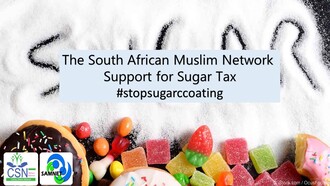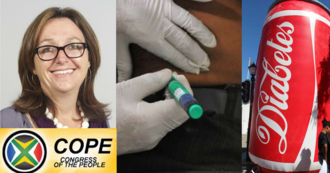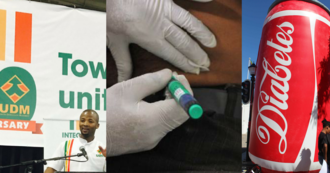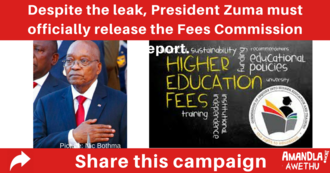- Featured
- Clean air
- Climate justice
- Consumer Rights
- Corporate Accountability
- Data access
- Early Childhood Development
- Economic fairness
- Education
- Electoral fairness
- Environmental justice
- Food justice
- Gender based violence
- Grants/social assistance
- Health
- Housing and infrastructure
- Industry interference
- Land Justice
- LGBTQIA+ rights
- Media/ information access
- Public transport
- Racism
- Reparations
- Safety
- Sanitation
- Service Delivery
- Sexual and Reproductive Rights
- Social justice
- Unemployment
- Womxn's rights/ gender equality
- Workers' rights
- More
-
ACDP vote yes in the national assembly for the Health Promotion LevyDiabetes is the leading cause of death for South African women [2], yet the beverage industry is desperately trying to delay and further water down the sugary drinks tax (Health Promotion Levy). BevSA and Coca-Cola’s job losses scaremongering has been exposed as exaggerated [1] and self serving [3]. A recent study showed that 3/4s of adult South Africans believe that government is doing the right thing when it makes and enforces policy to discourage the consumption of sugary beverages and junk foods [4]. We can’t underestimate how far the likes of Coca-Cola will go to protect their profits at the expense of our health. Leaked Coca-Cola executive emails show that the company has managed to get a “seat at the table in on-going regulatory discussions with the Ministry of Health” and has been fighting the tax [5]. BevSA and Coca-Cola also managed to keep health experts and advocates out of the NEDLAC process. Treasury seems to be standing up against companies like Coca-Cola and announced that the sugary drinks tax is likely to be introduced in April 2018. Treasury Deputy Director General Ismail Momoniat went one step further, acknowledging the criticism from the health sector regarding the watering down of the sugary drinks tax, stating that they would “... increase the tax until we get the result we need” [6]. South Africa can’t afford any further delays or the watering down of the sugary drinks tax. [1] Sugar tax: Job losses lower than industry’s projections. Amy Green for Health-e news June 2017 [2] Diabetes - the silent killer. Amy Green for Health-e News August 15, 2017 [3] SA’s proposed sugar tax: claims about calories & job losses checked. Kate Wilkinson & Vinayak Bhardwaj for Africa Check August 2016 [4] 70% of South Africans support sugar tax - Genesis study August 31, 2017 http://www.genesis-analytics.com/news/2017/70-of-sa-suppports-sugar-tax-genesis-study [5] New #CokeLeak: Soda Tax Opposition in 8 More Countries. https://medium.com/cokeleak/new-cokeleak-soda-tax-opposition-in-8-more-countries-a53e2df3d8e4 [6] Sugary drinks tax set for April next year. Kerry Cullinan for Health-E News September 201727 of 100 SignaturesCreated by amandla mobi member

-
EFF, vote yes in the national assembly for the Health Promotion LevyDiabetes is the leading cause of death for South African women [2], yet the beverage industry is desperately trying to delay and further water down the sugary drinks tax (Health Promotion Levy). BevSA and Coca-Cola’s job losses scaremongering has been exposed as exaggerated [1] and self serving [3]. A recent study showed that 3/4s of adult South Africans believe that government is doing the right thing when it makes and enforces policy to discourage the consumption of sugary beverages and junk foods [4]. We can’t underestimate how far the likes of Coca-Cola will go to protect their profits at the expense of our health. Leaked Coca-Cola executive emails show that the company has managed to get a “seat at the table in on-going regulatory discussions with the Ministry of Health” and has been fighting the tax [5]. BevSA and Coca-Cola also managed to keep health experts and advocates out of the NEDLAC process. Treasury seems to be standing up against companies like Coca-Cola and announced that the sugary drinks tax is likely to be introduced in April 2018. Treasury Deputy Director General Ismail Momoniat went one step further, acknowledging the criticism from the health sector regarding the watering down of the sugary drinks tax, stating that they would “... increase the tax until we get the result we need” [6]. South Africa can’t afford any further delays or the watering down of the sugary drinks tax. [1] Sugar tax: Job losses lower than industry’s projections. Amy Green for Health-e news June 2017 [2] Diabetes - the silent killer. Amy Green for Health-e News August 15, 2017 [3] SA’s proposed sugar tax: claims about calories & job losses checked. Kate Wilkinson & Vinayak Bhardwaj for Africa Check August 2016 [4] 70% of South Africans support sugar tax - Genesis study August 31, 2017 http://www.genesis-analytics.com/news/2017/70-of-sa-suppports-sugar-tax-genesis-study [5] New #CokeLeak: Soda Tax Opposition in 8 More Countries. https://medium.com/cokeleak/new-cokeleak-soda-tax-opposition-in-8-more-countries-a53e2df3d8e4 [6] Sugary drinks tax set for April next year. Kerry Cullinan for Health-E News September 201743 of 100 SignaturesCreated by amandla mobi member

-
DA, vote yes in the national assembly for the Health Promotion LevyDiabetes is the leading cause of death for South African women [2], yet the beverage industry is desperately trying to delay and further water down the sugary drinks tax (Health Promotion Levy). BevSA and Coca-Cola’s job losses scaremongering has been exposed as exaggerated [1] and self serving [3]. A recent study showed that 3/4s of adult South Africans believe that government is doing the right thing when it makes and enforces policy to discourage the consumption of sugary beverages and junk foods [4]. We can’t underestimate how far the likes of Coca-Cola will go to protect their profits at the expense of our health. Leaked Coca-Cola executive emails show that the company has managed to get a “seat at the table in on-going regulatory discussions with the Ministry of Health” and has been fighting the tax [5]. BevSA and Coca-Cola also managed to keep health experts and advocates out of the NEDLAC process. Treasury seems to be standing up against companies like Coca-Cola and announced that the sugary drinks tax is likely to be introduced in April 2018. Treasury Deputy Director General Ismail Momoniat went one step further, acknowledging the criticism from the health sector regarding the watering down of the sugary drinks tax, stating that they would “... increase the tax until we get the result we need” [6]. South Africa can’t afford any further delays or the watering down of the sugary drinks tax. [1] Sugar tax: Job losses lower than industry’s projections. Amy Green for Health-e news June 2017 [2] Diabetes - the silent killer. Amy Green for Health-e News August 15, 2017 [3] SA’s proposed sugar tax: claims about calories & job losses checked. Kate Wilkinson & Vinayak Bhardwaj for Africa Check August 2016 [4] 70% of South Africans support sugar tax - Genesis study August 31, 2017 http://www.genesis-analytics.com/news/2017/70-of-sa-suppports-sugar-tax-genesis-study [5] New #CokeLeak: Soda Tax Opposition in 8 More Countries. https://medium.com/cokeleak/new-cokeleak-soda-tax-opposition-in-8-more-countries-a53e2df3d8e4 [6] Sugary drinks tax set for April next year. Kerry Cullinan for Health-E News September 201757 of 100 SignaturesCreated by amandla mobi member

-
ANC, vote yes in the national assembly for the Health Promotion LevyDiabetes is the leading cause of death for South African women [2], yet the beverage industry is desperately trying to delay and further water down the sugary drinks tax (Health Promotion Levy). BevSA and Coca-Cola’s job losses scaremongering has been exposed as exaggerated [1] and self serving [3]. A recent study showed that 3/4s of adult South Africans believe that government is doing the right thing when it makes and enforces policy to discourage the consumption of sugary beverages and junk foods [4]. We can’t underestimate how far the likes of Coca-Cola will go to protect their profits at the expense of our health. Leaked Coca-Cola executive emails show that the company has managed to get a “seat at the table in on-going regulatory discussions with the Ministry of Health” and has been fighting the tax [5]. BevSA and Coca-Cola also managed to keep health experts and advocates out of the NEDLAC process. Treasury seems to be standing up against companies like Coca-Cola and announced that the sugary drinks tax is likely to be introduced in April 2018. Treasury Deputy Director General Ismail Momoniat went one step further, acknowledging the criticism from the health sector regarding the watering down of the sugary drinks tax, stating that they would “... increase the tax until we get the result we need” [6]. South Africa can’t afford any further delays or the watering down of the sugary drinks tax. [1] Sugar tax: Job losses lower than industry’s projections. Amy Green for Health-e news June 2017 [2] Diabetes - the silent killer. Amy Green for Health-e News August 15, 2017 [3] SA’s proposed sugar tax: claims about calories & job losses checked. Kate Wilkinson & Vinayak Bhardwaj for Africa Check August 2016 [4] 70% of South Africans support sugar tax - Genesis study August 31, 2017 http://www.genesis-analytics.com/news/2017/70-of-sa-suppports-sugar-tax-genesis-study [5] New #CokeLeak: Soda Tax Opposition in 8 More Countries. https://medium.com/cokeleak/new-cokeleak-soda-tax-opposition-in-8-more-countries-a53e2df3d8e4 [6] Sugary drinks tax set for April next year. Kerry Cullinan for Health-E News September 201796 of 100 SignaturesCreated by amandla mobi member

-
STOPSUGARCOATINGOur nation’s health is in crisis and Sugary drinks are one of the most significant contributors to diabetes, obesity, heart disease, liver and kidney damage, and some cancers that are on the rise globally and in South Africa.2 of 100 SignaturesCreated by Maqsuda Motala
-
COPE, vote yes for the Health Promotion Levy (sugary drinks tax)We know the beverage industry is desperately trying to delay and further water down the sugary drinks tax (Health Promotion Levy). BevSA and Coca-Cola’s job losses scaremongering has been exposed as exaggerated [1] and self serving [2]. A recent study showed that 3/4s of adult South Africans believe that government is doing the right thing when it makes and enforces policy to discourage the consumption of sugary beverages and junk foods [3]. We can’t underestimate how far the likes of Coca-Cola will go to protect their profits at the expense of our health. Leaked Coca-Cola executive emails show that the company has managed to get a “seat at the table in on-going regulatory discussions with the Ministry of Health” and has been fighting the tax [4]. BevSA and Coca-Cola also managed to keep health experts and advocates out of the NEDLAC process. Treasury seems to be standing up against companies like Coca-Cola and announced that the sugary drinks tax is likely to be introduced in April 2018. Treasury Deputy Director General Ismail Momoniat went one step further, acknowledging the criticism from the health sector regarding the watering down of the sugary drinks tax, stating that they would “... increase the tax until we get the result we need” [5]. South Africa can’t afford any further delays or the watering down of the sugary drinks tax. [1] Sugar tax: Job losses lower than industry’s projections. Amy Green for Health-e news June 2017 [2] SA’s proposed sugar tax: claims about calories & job losses checked. Kate Wilkinson & Vinayak Bhardwaj for Africa Check August 2016 [3] 70% of South Africans support sugar tax - Genesis study August 31, 2017 http://www.genesis-analytics.com/news/2017/70-of-sa-suppports-sugar-tax-genesis-study [4] New #CokeLeak: Soda Tax Opposition in 8 More Countries. https://medium.com/cokeleak/new-cokeleak-soda-tax-opposition-in-8-more-countries-a53e2df3d8e4 [5] Sugary drinks tax set for April next year. Kerry Cullinan for Health-E News September 201793 of 100 SignaturesCreated by amandla mobi member

-
UDM, vote yes for the Health Promotion Levy (sugary drinks tax)We know the beverage industry is desperately trying to delay and further water down the sugary drinks tax (Health Promotion Levy). BevSA and Coca-Cola’s job losses scaremongering has been exposed as exaggerated [1] and self serving [2]. A recent study showed that 3/4s of adult South Africans believe that government is doing the right thing when it makes and enforces policy to discourage the consumption of sugary beverages and junk foods [3]. We can’t underestimate how far the likes of Coca-Cola will go to protect their profits at the expense of our health. Leaked Coca-Cola executive emails show that the company has managed to get a “seat at the table in on-going regulatory discussions with the Ministry of Health” and has been fighting the tax [4]. BevSA and Coca-Cola also managed to keep health experts and advocates out of the NEDLAC process. Treasury seems to be standing up against companies like Coca-Cola and announced that the sugary drinks tax is likely to be introduced in April 2018. Treasury Deputy Director General Ismail Momoniat went one step further, acknowledging the criticism from the health sector regarding the watering down of the sugary drinks tax, stating that they would “... increase the tax until we get the result we need” [5]. South Africa can’t afford any further delays or the watering down of the sugary drinks tax. [1] Sugar tax: Job losses lower than industry’s projections. Amy Green for Health-e news June 2017 [2] SA’s proposed sugar tax: claims about calories & job losses checked. Kate Wilkinson & Vinayak Bhardwaj for Africa Check August 2016 [3] 70% of South Africans support sugar tax - Genesis study August 31, 2017 http://www.genesis-analytics.com/news/2017/70-of-sa-suppports-sugar-tax-genesis-study [4] New #CokeLeak: Soda Tax Opposition in 8 More Countries. https://medium.com/cokeleak/new-cokeleak-soda-tax-opposition-in-8-more-countries-a53e2df3d8e4 [5] Sugary drinks tax set for April next year. Kerry Cullinan for Health-E News September 201780 of 100 SignaturesCreated by amandla mobi member

-
EFF, vote yes for the Health Promotion Levy (sugary drinks tax)We know the beverage industry is desperately trying to delay and further water down the sugary drinks tax (Health Promotion Levy). BevSA and Coca-Cola’s job losses scaremongering has been exposed as exaggerated [1] and self serving [2]. A recent study showed that 3/4s of adult South Africans believe that government is doing the right thing when it makes and enforces policy to discourage the consumption of sugary beverages and junk foods [3]. We can’t underestimate how far the likes of Coca-Cola will go to protect their profits at the expense of our health. Leaked Coca-Cola executive emails show that the company has managed to get a “seat at the table in on-going regulatory discussions with the Ministry of Health” and has been fighting the tax [4]. BevSA and Coca-Cola also managed to keep health experts and advocates out of the NEDLAC process. Treasury seems to be standing up against companies like Coca-Cola and announced that the sugary drinks tax is likely to be introduced in April 2018. Treasury Deputy Director General Ismail Momoniat went one step further, acknowledging the criticism from the health sector regarding the watering down of the sugary drinks tax, stating that they would “... increase the tax until we get the result we need” [5]. South Africa can’t afford any further delays or the watering down of the sugary drinks tax. [1] Sugar tax: Job losses lower than industry’s projections. Amy Green for Health-e news June 2017 [2] SA’s proposed sugar tax: claims about calories & job losses checked. Kate Wilkinson & Vinayak Bhardwaj for Africa Check August 2016 [3] 70% of South Africans support sugar tax - Genesis study August 31, 2017 http://www.genesis-analytics.com/news/2017/70-of-sa-suppports-sugar-tax-genesis-study [4] New #CokeLeak: Soda Tax Opposition in 8 More Countries. https://medium.com/cokeleak/new-cokeleak-soda-tax-opposition-in-8-more-countries-a53e2df3d8e4 [5] Sugary drinks tax set for April next year. Kerry Cullinan for Health-E News September 2017107 of 200 SignaturesCreated by amandla mobi member

-
DA, vote yes for the Health Promotion Levy (sugary drinks tax)We know the beverage industry is desperately trying to delay and further water down the sugary drinks tax (Health Promotion Levy). BevSA and Coca-Cola’s job losses scaremongering has been exposed as exaggerated [1] and self serving [2]. A recent study showed that 3/4s of adult South Africans believe that government is doing the right thing when it makes and enforces policy to discourage the consumption of sugary beverages and junk foods [3]. We can’t underestimate how far the likes of Coca-Cola will go to protect their profits at the expense of our health. Leaked Coca-Cola executive emails show that the company has managed to get a “seat at the table in on-going regulatory discussions with the Ministry of Health” and has been fighting the tax [4]. BevSA and Coca-Cola also managed to keep health experts and advocates out of the NEDLAC process. Treasury seems to be standing up against companies like Coca-Cola and announced that the sugary drinks tax is likely to be introduced in April 2018. Treasury Deputy Director General Ismail Momoniat went one step further, acknowledging the criticism from the health sector regarding the watering down of the sugary drinks tax, stating that they would “... increase the tax until we get the result we need” [5]. South Africa can’t afford any further delays or the watering down of the sugary drinks tax. [1] Sugar tax: Job losses lower than industry’s projections. Amy Green for Health-e news June 2017 [2] SA’s proposed sugar tax: claims about calories & job losses checked. Kate Wilkinson & Vinayak Bhardwaj for Africa Check August 2016 [3] 70% of South Africans support sugar tax - Genesis study August 31, 2017 http://www.genesis-analytics.com/news/2017/70-of-sa-suppports-sugar-tax-genesis-study [4] New #CokeLeak: Soda Tax Opposition in 8 More Countries. https://medium.com/cokeleak/new-cokeleak-soda-tax-opposition-in-8-more-countries-a53e2df3d8e4 [5] Sugary drinks tax set for April next year. Kerry Cullinan for Health-E News September 2017257 of 300 SignaturesCreated by amandla mobi member

-
ANC, vote yes for the Health Promotion Levy (sugary drinks tax)We know the beverage industry is desperately trying to delay and further water down the sugary drinks tax (Health Promotion Levy). BevSA and Coca-Cola’s job losses scaremongering has been exposed as exaggerated [1] and self serving [2]. A recent study showed that 3/4s of adult South Africans believe that government is doing the right thing when it makes and enforces policy to discourage the consumption of sugary beverages and junk foods [3]. We can’t underestimate how far the likes of Coca-Cola will go to protect their profits at the expense of our health. Leaked Coca-Cola executive emails show that the company has managed to get a “seat at the table in on-going regulatory discussions with the Ministry of Health” and has been fighting the tax [4]. BevSA and Coca-Cola also managed to keep health experts and advocates out of the NEDLAC process. Treasury seems to be standing up against companies like Coca-Cola and announced that the sugary drinks tax is likely to be introduced in April 2018. Treasury Deputy Director General Ismail Momoniat went one step further, acknowledging the criticism from the health sector regarding the watering down of the sugary drinks tax, stating that they would “... increase the tax until we get the result we need” [5]. South Africa can’t afford any further delays or the watering down of the sugary drinks tax. [1] Sugar tax: Job losses lower than industry’s projections. Amy Green for Health-e news June 2017 [2] SA’s proposed sugar tax: claims about calories & job losses checked. Kate Wilkinson & Vinayak Bhardwaj for Africa Check August 2016 [3] 70% of South Africans support sugar tax - Genesis study August 31, 2017 http://www.genesis-analytics.com/news/2017/70-of-sa-suppports-sugar-tax-genesis-study [4] New #CokeLeak: Soda Tax Opposition in 8 More Countries. https://medium.com/cokeleak/new-cokeleak-soda-tax-opposition-in-8-more-countries-a53e2df3d8e4 [5] Sugary drinks tax set for April next year. Kerry Cullinan for Health-E News September 2017516 of 600 SignaturesCreated by amandla mobi member

-
Release the Fees Commission reportThe Minister of Finance is schedule to table the medium-term budget on Wednesday, 25 October 2017. This is an opportune moment for government to announce a favorable stance in response to demands made by Fees Must Fall. The "no-fee varsity" report, which the amandla.mobi community successfully mobilised for it to be made public, set out 12 recommendations showing how free university education for students from low income households can be provided. These recommendations have not yet been implemented. Just last week, President Zuma reshuffled his Cabinet and removed Dr Blade Nzimande as Minister of Higher Education. This is a critical time for the report to be released and to allow all stakeholders to engage with its contents. Join the campaign to demand President Jacob G. Zuma, immediately releases the Fees Commission report to the public.399 of 400 SignaturesCreated by Amandla.mobi Member
-
Support the #UFSShutdownThese issues we raise relate to the academic, physical and socio-economic well being of students. The university is mandated to work on achieving these goals. Your support is required to pressure the university to take decisive actions in ensuring it does so. The university must declare no increment, a revised timetable, its support for our cause, the provision of free WiFi and the accreditation of student accommodation. We can no longer allow UFS students to be exposed to these issues.1,267 of 2,000 SignaturesCreated by Tshiamo Malatji
.png)
